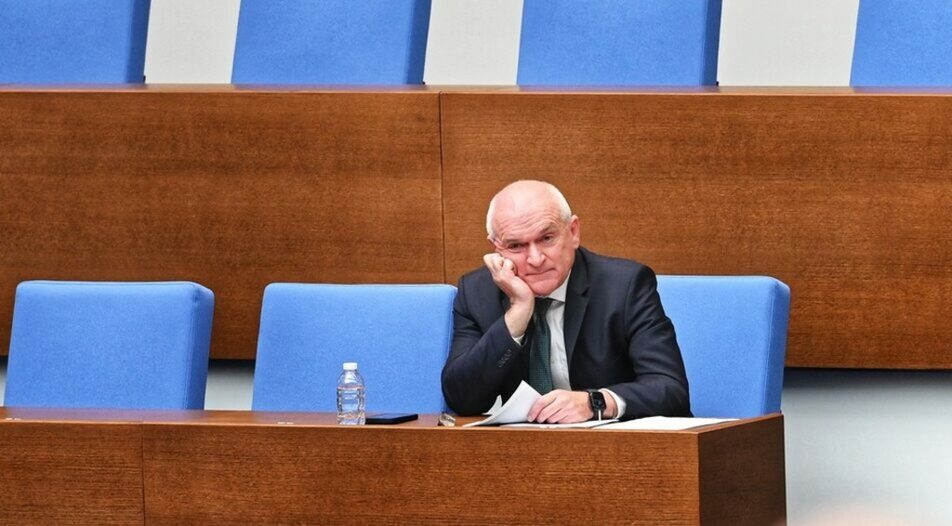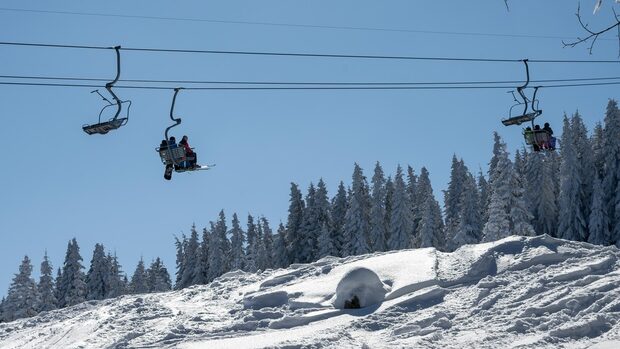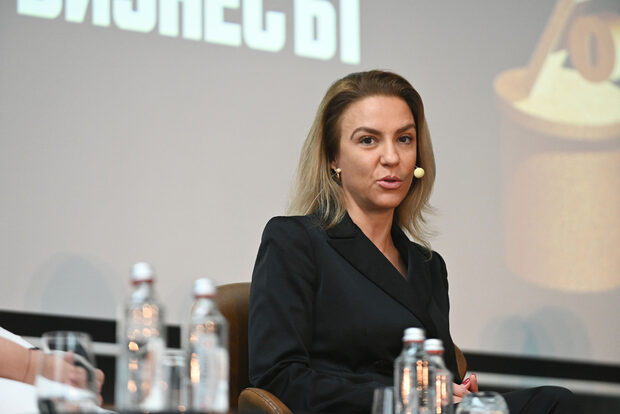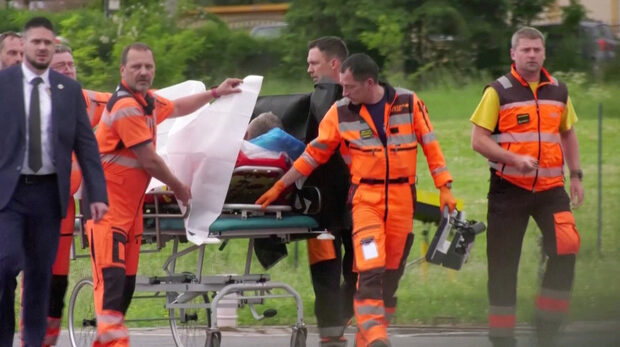So here's a question that gets asked often. Who's actually in charge now, since everyone seems to be in pre-election campaign mode?
I mean, not formally - we all know that Dimitar Glavchev, the ex-head of the Audit Office single-handedly took on and fulfilled the mandate, given by the President. Just imagine how impossible that is, for a moment. You're the head of a National Institution, probably an expert in a field, or even a political figure, installed to shield your allies from investigations or whatever. And then all of a sudden, you have to form a government within 7 days.
You don't have the backing of the Presidential office, or the apparatus of a party, and you have a week to find and convince 15-20 people to give up whatever they are doing to become caretaker ministers in a cabinet that's gonna be around for several months. And to be open for political smear campaigns and probably be held liable by the prosecution service for any signature they put. And they have to be at least somewhat connected to the field they are going to run.
Even if you're the best connected person in Bulgaria, that would be a hard call. When facing this task, Glavchev's deputy basically broke down in front of cameras and said his wife hadn't slept in the past 2 weeks.
So we're to believe the ex-GERB party member suddenly decided to assume the burden and found all those people after long sessions pondering at his desk late at night? It took the President weeks to form a caretaker cabinet, with all the power in his office and all the advisors at his disposal. What I'm getting at here is that the new system for caretaker governments is not a brilliant idea, because the only people prepared to take up the challenge will be those who have solid backing.
And as for who has Glavchev's back, here is a quick "follow the money" guide:
- The head of the Road Agency (running around 2-3 billion) was changed in the first week.
- The head of Railway construction company (procuring another several billions, and also being embroiled in European prosecution investigations) was changed this week
- The head of National Agricultural Fund (responsible for all the billions of euros for farmers and agricultural regions) was changed this week
- Yesterday the new Regional minister announced that she's restoring the procurement orders for several billions levs for road maintenance, which were halted by the previous government for irregularities
Changing the heads of the 3 main financing institutions and then rushing to give the biggest procurement in the space of a month is not something that you do without a plan. Or without an order.
So here's to the return of the status quo. Not as brutally honest as in North Macedonia, still. But nonetheless indicative.
This newsletters was helped by
Martin Dimitrov
1. Politics this week:
Speaking of North Macedonia: VMRO-DPMNE is back and hard times lie aheadThe new PM to be - Christian Mitzkoski and the new President Gordana Davkova, are hardline VMRO activists. Therefore it's hard to imagine they will be welcoming to the French proposal, whereby North Macedonia would change its constitution to acknowledge a Bulgarian minority in the country, as already agreed by Skopje and Sofia. This also means no negotiations with the EU any time soon. Coupled with Serbia's turn to China, the Western Balkans are starting to drift away from the Union.
First polls are out: the status quo is back in Sofia
It was clear that the rotation cabinet - and its inevitable failure - would hit WCC-DB more than their ex-partners from GERB. The reformists' very entry into an "assemblage" with Borissov's party and, by proxy - with MRF - was seen as treachery by many of their supporters, who, unlike other parties' loyalists, subjected their faction to much greater scrutiny. But the extent of the damage is only seen now, exacerbated by the month-long dirty campaign against WCC's Assen Vassilev and Boyko Rashkov that tried to convince voters they are just as corrupt as everyone else.
According to the Alpha Research poll, which was the first one to be carried out after the formation of Glavchev's caretaker cabinet, WCC-DB now lags 8% behind GERB, which has consolidated its vote at 25.4%. The fight for third place between MRF and Vazrazhdane will be fierce, with the pro-Kremlin party trailing only 0.3% behind Delyan Peevski's party - 14.6 against 14.9%. BSP clings on to penultimate place with 8.5% and TISP barely scrapes in with 5.3%. None of the leftist proxies of the socialists or nationalists come close to the 4% mark.
And what about the EU elections?
The picture is pretty similar, with the small exception that WCC-DB are projected to lose less of their support - currently, Alpha projects them to gain 18.5% of the vote, which will amount to 3-4 MEPs against GERB's 25.1%, keeping their 5 current representatives. Vazrazhdane is projected to overtake (by less than half percent) MRF in this vote, with both sending 2 MEPs each, while the big loser will be BSP, which would only keep one or two of its European Parliament seats, compared to the five it held until now.
According to the pollsters, 40% of voters, which is about 2.6-2.65 million people, will vote in the parliamentary elections. The turnout for the European elections is expected to be slightly lower - 35%, or 2.3 million people.
2. Economy
The boom of the PharmaBulgaria's prescription and over-the-counter drug market experienced significant growth in 2023, with both retail and hospital markets seeing significant increases in sales, according to data from the global marketing and analytics company IQVIA. Prescription and over-the-counter drugs saw significant growth in 2023, reaching 2.7 billion euro (at retail prices of sales from drug wholesalers to pharmacies and hospitals).
Thus, prescription or over-the-counter products alone reach sales of 5.4 billion levs, representing a double-digit growth in the value of the overall market of 14.7%. Separately, the market for nutritional supplements in pharmacies is also growing and reached almost 419 million euro in 2023 according to sales from pharmacies to end customers, representing a 7.7% growth compared to 2022.
Can we get some new trains, please?
Transport Minister Georgi Gvozdeykov switched to direct negotiation on the mega order for the purchase of 35 new railcars, inviting four companies for negotiations, Sega newspaper reported on 6 May. A notice published in the public procurement register shows that Gvozdeykov's ministry will negotiate with the companies that participated unsuccessfully in the previous order, as well as with the Polish division of the German Stadler, which has already signed a contract on another large order with the ministry for 7 double-decker trains.
The train order has an estimated value of 1.1 billion levs and will see the purchase of 35 railcars with a minimum of 200 seats and a running speed of over 160 km/h.
In other train-related news
Figures:
20%The average increase in train fares of the Bulgarian Railways (BDZ), which have been applied since 7 May.
16 million levs
Is the amount BDZ will pay to transfer to e-tickets
4.3%
Is the annual growth in building permits for residential housing in the first quarter of this years compared to last.
4.8 million
Users are on the Internet daily in Bulgaria, and 70% of them shop online in the second half of 2023, shows a "Market Links" research.
3. Business
RoboticsThe Mizia-based robotics start-up has created the first Bulgarian autonomous mobile robot that can transform depending on the application. It is called MITO and its mass serial production will start in 2025 in the city.
Nuclear
The profit of the power plant decreased by 38 million levs to 182 million levs in Q1 of 2024 compared to the same period of 2023, and the revenue - by 279 million levs to 531 million levs, mainly due to low stock prices.
4. Watch out for:
People:On Tuesday, the court lifted the house arrest of businessman Vasil Bozhkov, who is a defendant in several serious cases, including for the non-payment of gambling taxes, incitement to murder, and illegal possession of cultural and historical property. Bozhkov will be running in the EU elections.
Mariya Gabriel
The ex-Foreign Minister, EU Commissioner and MEP is missing from GERB lists. This might mean she's either Borissov's pick for a new Commissioner mandate, or she's out of favor.
Vladimir Temelkov
The current deputy-mayor of Plovdiv seems to be a fast-rising star in GERB. The ex-businessmen in IT and construction now is part of the central electoral committee of Borissov's party and was seen sitting next to him at the opening of the campaign on 9th of May in Stara Zagora.
Date:
2025Is the year Bulgaria can join the OECD, said the caretaker PM after a meeting with the chair of the organization. 26 reports remain to be approved, however. At least something we can join next year, since we're probably not joining the eurozone
Institution:
Gradolyubiteli (City Lovers)Since we talk a lot about making cities better and how business can help the municipalities in it, we now practice what we preach.
We're bringing Paul Levy: the man who reinvented Philadelphia's center, to speak about city revival and how to do it.
The Masterclass will be on 22 May in Plovdiv and is invite-only. Readers of this newsletter however, can write to [email protected] and get an invite if there are places left.
Place:
The center of SofiaIt's not often this newsletter recommends the capital, yet the four nights of the LUNAR festival of light is worth it. Starting from 9th of May it will transform some of the most beautiful buildings, parks and squares of the capital. 3D mapping projections and light installations by artists from all over the world will transform the capital into a glamorous open-air gallery. This year's cultural event will offer 22 light works, a 4.5-kilometer walking route and an all-new festival zone - South Park 2.
Zen of the week:

Plovdiv's socialist oligarch and Russia consul Georgi Gergov held the mantle for Russian Ambassador Eleonora Mitrofanova, while attending the 9th of May celebrations on the Russian soldier monument in Plovdiv. Neither Gergov nor Mitrofanova are usually seen in public throughout the year.
So here's a question that gets asked often. Who's actually in charge now, since everyone seems to be in pre-election campaign mode?
I mean, not formally - we all know that Dimitar Glavchev, the ex-head of the Audit Office single-handedly took on and fulfilled the mandate, given by the President. Just imagine how impossible that is, for a moment. You're the head of a National Institution, probably an expert in a field, or even a political figure, installed to shield your allies from investigations or whatever. And then all of a sudden, you have to form a government within 7 days.












